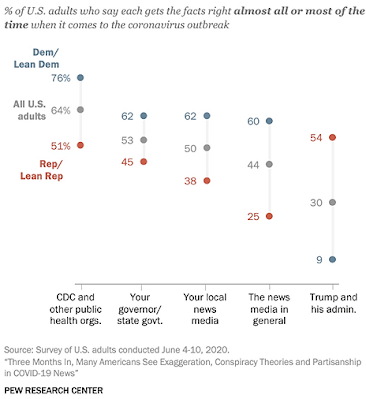Only 30% in Pew poll say Trump, feds get covid-19 facts right most or all of time; Republicans think crisis is being exaggerated

By David Bauder
For a story that has dominated the news during the past four months, a survey out Monday illustrates the difficulty that many Americans have in finding information they can believe about the coronavirus pandemic.
Three in 10 Americans say they trust President Donald Trump and his administration to get the facts straight all or most of the time when talking about covid-19, the Pew Research Center said.
“I can’t think of any precedent for that,” said Dan Fagin, director of New York University’s Science, Health and Environmental Reporting program, and a former reporter. “There’s a reason why that number is so low. Honestly, what disturbs even more is that there is 30 percent of the public who think they can believe the president on this.”The president, along with some other leaders, were criticized initially for not taking the threat seriously, for delivering misinformation about potential treatments and, even today, delivering mixed messages on the need for masks and social distancing.
Even though Trump was a polarizing figure before the health crisis, he had a chance to get Americans to rally behind him by offering solid, consistent information, said David Ropeik, retired Harvard University professor and author of How Risky Is It, Anyway? Why our Fears Don’t Always Match the Facts.
He cited former New York Mayor Rudolph Giuliani in the wake of the Sept. 11 attacks as an example of a leader people rallied behind in a time of crisis.
“Trust is an intuitive sense of who we think is on our side, and that is why risk communication is really crucial in a time like this,” Ropeik said. “That is why the federal government has blown this and many of the state governments haven’t.”
The Pew survey found dramatic differences in how the public assessed key sources of information on coronavirus, said Amy Mitchell, Pew’s director of journalism research.
A little more than half of those surveyed (53%) trusted the accuracy of information they were getting from governors or state leaders, with 44% believing the news media. Trust numbers were higher for local media sources, Pew said.
Nearly two of three Americans polled said they had confidence in the information they were getting from the Centers for Disease Control and other health organizations.
“What is encouraging is that people do have great faith in public health experts,” Fagin said. “That’s why Anthony Fauci’s role is so important and that it’s a great blessing that he’s been involved in all of this.”
Ropeik said social media has muddied the waters with misinformation. That’s illustrated by Pew’s finding that 71% of Americans had heard the conspiracy theory that the virus outbreak had been intentionally planned, and that 36% said that is probably or definitely true.
Among people who cite the president and his administration as their primary source of information about the coronavirus, 56% of Pew’s respondents said they believed that theory, which is unsupported by evidence.
The survey also found evidence of a growing partisan divide in beliefs. For example, a majority of Republicans (54%) said they believed most or all of information provided by Trump, while only 9% of Democrats do.
More Republicans increasingly believe the coronavirus is overblown, said Pew, which conducted an online survey between June 4-10 of 9,654 people in a panel of adults selected randomly.
While Ropeik is less confident, NYU’s Fagin said he believed Trump had the ability to turn things around if he sticks with facts and models important behavior, such as wearing a mask in public and insisting on social distancing by his supporters.
